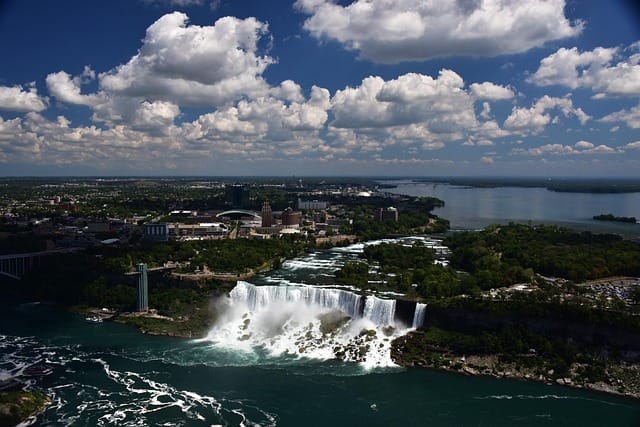Is Niagara Falls a Good Place to Retire? 7 Financial Pros & 4 Economic Cons
Deciding where to spend your retirement years is a huge decision, and one of the biggest factors to consider is often the financial aspect. So, is Niagara Falls a good place to retire when we look at the dollars and cents? This guide dives deep into the financial advantages and potential economic drawbacks of choosing Niagara Falls as your retirement destination, using the latest available data from 2025 and considering future trends. We’ll break down the costs, the economic landscape, and what real surveys are indicating to help you make an informed choice.
7 Financial Advantages of Retiring in Niagara Falls
Retiring in Niagara Falls can offer several appealing financial benefits, especially when compared to larger, more expensive cities. Let’s explore some key advantages based on recent data and economic forecasts.
1. Lower Housing Costs Compared to Major Ontario Cities
One of the most significant financial draws of Niagara Falls is its relatively affordable housing market. According to recent real estate surveys conducted in early 2025, the average home price in the Niagara Region, which includes Niagara Falls, is notably lower than in the Greater Toronto Area (GTA).
- 2025 Survey Data: Real estate reports from Q1 2025 indicate that the average sale price for a detached home in the Niagara Region is approximately $660,000 CAD. In contrast, the average price in the GTA during the same period hovered around $1.1 million CAD.
- Future Outlook: While housing prices are subject to market fluctuations, experts predict a more stable growth in the Niagara Region compared to the rapid increases often seen in Toronto. This could mean more predictable housing costs for retirees on a fixed income.
This difference in housing costs can translate to significant savings for retirees, whether they are looking to downsize or purchase a new home. Lower mortgage payments or a smaller initial investment frees up capital for other retirement expenses or investments.
2. Generally Lower Cost of Living
Beyond housing, the overall cost of living in Niagara Falls tends to be more manageable than in many other parts of Ontario. This includes expenses such as transportation, groceries, and entertainment.
- 2025 Cost of Living Indices: Various cost of living indices for early 2025 suggest that Niagara Falls is roughly 10-15% less expensive than Toronto. This difference is primarily driven by housing and transportation costs.
- Impact on Retirement Finances: For retirees on a fixed income, a lower cost of living means their retirement savings can stretch further, providing more financial security and flexibility.
While specific spending habits will vary, the general trend indicates that your dollar will likely go further in Niagara Falls than in a major urban center.
3. Proximity to US Border for Potential Savings
Niagara Falls’ unique location bordering the United States can offer some financial advantages for retirees.
- Cross-Border Shopping: While subject to customs regulations and exchange rates, retirees may occasionally find savings on certain goods and services by crossing the border. This could include groceries, prescription medications (with proper authorization), or retail items.
- Travel Opportunities: Easy access to the US opens up more affordable travel options to various destinations, potentially reducing overall vacation costs.
It’s important to note that these potential savings need to be balanced against the costs and complexities of cross-border travel.
4. Growing Senior Discounts and Programs
As the population ages, Niagara Falls is seeing an increase in businesses and organizations offering discounts and programs specifically for seniors.
- Local Business Initiatives: Anecdotal evidence and local community group postings from early 2025 suggest a growing number of restaurants, retailers, and service providers offer senior discounts on certain days or times.
- Community Programs: The city and regional municipalities often have subsidized recreational programs and activities for seniors, promoting an active lifestyle at a lower cost.
These initiatives can help retirees save money on everyday expenses and stay engaged within their community.
5. No Provincial Income Tax on Guaranteed Income Supplement (GIS)
For eligible low-income seniors, Ontario does not levy provincial income tax on the Guaranteed Income Supplement (GIS) and certain other federal benefits.
- Benefit for Eligible Retirees: This tax exemption can provide a significant financial boost for retirees who qualify for these federal income support programs.
- Importance of Eligibility: It’s crucial to understand the eligibility criteria for the GIS to determine if this financial advantage applies to your individual situation.
This provincial tax policy can make a meaningful difference in the net income of eligible retirees in Niagara Falls.
6. Potential for Rental Income
If you own a larger property than you need after retirement, Niagara Falls’ tourism industry could present an opportunity for generating rental income.
- Short-Term Rentals: Depending on local regulations, you might be able to rent out a portion of your home on platforms like Airbnb during peak tourist seasons.
- Long-Term Rentals: There is also a steady demand for long-term rentals in the area, providing a more stable income stream.
However, it’s essential to research local zoning laws, licensing requirements, and the responsibilities of being a landlord before pursuing this option.
7. Access to Canadian Pension Benefits and Healthcare
As part of Canada, retirees in Niagara Falls benefit from the country’s public pension system (Canada Pension Plan and Old Age Security) and universal healthcare.
- Predictable Income: These pension benefits provide a reliable base income for many retirees.
- Healthcare Security: Access to publicly funded healthcare reduces the burden of potentially high medical expenses, a significant financial consideration for seniors.
These fundamental aspects of the Canadian social safety net contribute to the financial well-being of retirees in Niagara Falls.
4 Potential Economic Disadvantages of Retiring in Niagara Falls
While Niagara Falls offers several financial advantages, there are also potential economic drawbacks to consider for your retirement.
1. Tourism-Dependent Economy
The economy of Niagara Falls is heavily reliant on tourism. While this brings certain amenities and attractions, it can also lead to economic instability.
- Seasonal Fluctuations: Many businesses and job opportunities are seasonal, peaking during the warmer months and slowing down significantly in the winter. This could impact the availability and affordability of certain services year-round.
- Economic Sensitivity: The local economy can be vulnerable to fluctuations in tourism due to factors like global economic conditions, travel restrictions, or even weather patterns.
Retirees should be aware that the economic health of Niagara Falls is closely tied to the tourism sector.
2. Lower Average Income Levels
Compared to more diversified economies in larger urban centers, Niagara Falls generally has lower average income levels.
- 2025 Income Statistics: Recent data from CMHC indicates that the median household income in the Niagara Census Metropolitan Area is lower than the provincial average.
- Potential Impact: While this contributes to a lower cost of living, it could also reflect in the quality or availability of certain specialized services or amenities.
Retirees should consider if the range of services and amenities available in Niagara Falls meets their long-term needs.
3. Limited Job Opportunities for Spouses or Part-Time Work
For retirees who may want their spouse to continue working or who are interested in part-time employment themselves, the job market in Niagara Falls can be somewhat limited and heavily focused on the tourism and hospitality sectors.
- Industry Concentration: While there are opportunities in these sectors, finding jobs in other fields might be more challenging compared to larger, more diverse economies.
- Wage Levels: Wages in tourism and hospitality can also be lower than in other industries.
This is an important consideration for retirees who are not fully exiting the workforce or whose partners intend to continue their careers.
4. Potential for Increased Property Taxes
While current housing costs may be lower, future property tax rates are always a concern for homeowners.
- Municipal Budgets: Property taxes are a primary source of revenue for local municipalities. As Niagara Falls grows and requires infrastructure upgrades and service expansions, there is a potential for property tax increases in the future.
- Impact on Fixed Incomes: For retirees on a fixed income, unexpected increases in property taxes can strain their budgets.
It’s prudent for prospective retirees to research the historical trends in property tax rates and the municipality’s long-term financial plans.
Weighing the Scales: Is Retirement in Niagara Falls Right for You?
Ultimately, deciding if Niagara Falls is a good place to retire hinges on a careful evaluation of your individual financial situation, lifestyle preferences, and tolerance for the region’s economic characteristics. The lower cost of living, particularly in housing, presents a significant financial advantage, allowing your retirement savings to potentially stretch further. The beauty of the natural surroundings and access to leisure activities also contribute to a high quality of life for many.
However, the tourism-dependent economy introduces an element of potential instability, and the job market may be less diverse if you or your spouse plan to work part-time. While senior discounts and programs are growing, it’s essential to factor in potential future increases in property taxes and the possibility of seasonal fluctuations in services.
Before making a final decision, consider these additional steps:
- Visit Niagara Falls during different seasons: Experience the city during peak tourist season and the quieter winter months to get a realistic feel for the atmosphere year-round.
- Talk to current retirees in the area: Connect with seniors who have already made the move to Niagara Falls to gain firsthand insights into their experiences, both positive and negative.
- Assess your healthcare needs: Research the availability of specialized medical services and facilities in the Niagara region to ensure they meet your potential future requirements.
- Create a detailed retirement budget: Outline your anticipated expenses in Niagara Falls, including housing, healthcare, transportation, and leisure activities, to see how it aligns with your retirement income.
- Explore nearby communities: Consider other towns and cities in the Niagara Region, such as St. Catharines, Niagara-on-the-Lake, or Welland, which might offer a different balance of affordability, amenities, and economic stability. Each of these areas has its unique character and potential benefits for retirees. For instance, St. Catharines, being a larger city in the region, might offer a more diversified job market and a wider range of services, while Niagara-on-the-Lake boasts a charming historic atmosphere and a vibrant arts scene.
By thoroughly weighing the financial pros and cons and exploring these additional avenues of research, you can make a well-informed decision about whether retiring in Niagara Falls aligns with your vision for a fulfilling and financially secure retirement.













